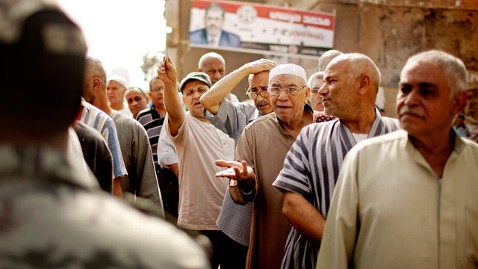Hopeful Egyptians Turn Out for Historic Elections

(Image Credit: Pete Muller/AP Photo)
CAIRO - Long lines snaked out of polling stations across Egypt this morning as Egyptians went to cast their ballots in the country's first free and fair presidential elections, the first in Egypt since President Hosni Mubarak was ousted February 2011.
The sunny day was reflected in the attitudes of the voters who waited happily and calmly, often for hours, to cast their ballots for the 13 candidates. "I think everyone's upbeat, everyone's looking forward to the future," said Mohammed Kamel, the CEO of a real estate development firm who was waiting to vote at a school in Giza. "The country's sort of been on hold for the past 15 months. Everyone's looking for stability."
The faces of the candidates stared out from campaign posters lining Cairo's congested streets. Voters studied registration lists on walls to figure out where to go as soldiers and police kept the lines at polling stations moving as swiftly as they could. Turnout was expected to top 60 percent among Egypt's 50 million voters.
Polling here has been inconsistent and is generally unreliable but at least four front-runners have emerged in the race to replace Mubarak and send the military, which has been ruling the country, back to their barracks. They include Mubarak's former foreign minister, Amr Moussa, a former Muslim Brotherhood official named Abdel Moneim Abul Fotouh, Mubarak's last prime minister, Ahmed Shafiq, and the Muslim Brotherhood candidate, Mohammed Morsi. Many Cairo voters today also expressed support for liberal candidate Hamdeen Sabbahi. If no candidate gets 50 percent in the first round, the top two candidates will face each other in a run-off in mid-June.
"We believe in the change, that's why all the people here are staying [in line for hours]," said banker Ahmed Morsi, who said he would vote for Sabbahi. "I'm Muslim but I'm not too much into the Islamist [candidates]. I'm trying to choose the one that can make the balance between people. That's going to be my choice."
Islamists dominated earlier parliamentary elections, winning around 70 percent of the seats between the Muslim Brotherhood's Freedom and Justice Party and the ultra-conservative Salafists. But both the Muslim Brotherhood's first presidential candidate and the Salafist candidate were disqualified from the election and the Muslim Brotherhood's popularity has waned since the parliamentary elections. That gave a boost to Abdel Moneim Abul Fotouh, who left the Muslim Brotherhood to run for president and is seen as a moderate, endorsed by Egyptians from Salafists to liberal seculars.
"It's a long run of struggling against dictatorship," said professor Ahmad Gamal, voting for Abul Fotouh. "I think today we are divided into two parts: Islamists and liberals. We need Islamists to be moderate and liberals to be moderate."
"Egyptians feel they need to put an end to this struggle against corruption," he added. They want "their right to live in a clean country, their rights to live in democracy."
The turmoil and violence of the past year and a half caused foreign investment to flee the country and tourism to drop precipitously. Unemployment has soared and Egyptians of all stripes complain of skyrocketing crime. That has led to calls for candidates such as Moussa and Shafiq, who many believe can restore stability given their experience in government, even if it was Mubarak's.
"I think anyone who does not focus on the economy is a president born dead. This is the most significant challenge in the country," real estate developer Kamel said.
Aside from the big question of who will be president, equally pressing are the questions of what his powers will be, given that a new Constitution has yet to be written, and how prominent the role of the military will be.
But those concerns seemed to take a back seat to the significance of the day as the voters, most reticent to reveal for whom they were voting, expressed hope for this new chapter in Egyptian history.
"I'm very happy, I feel freedom," one woman said. "Of course I'm optimistic; a new Egypt and a new era."